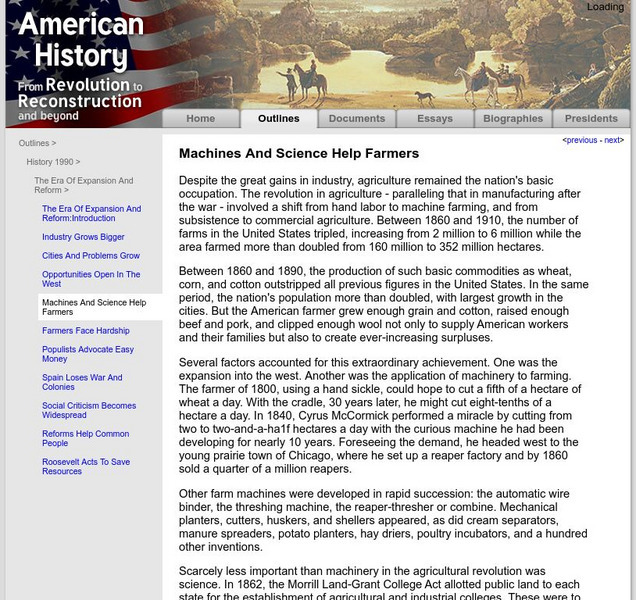Curated OER
Flush It! Throw It! Out of Sight, Out of Mind!
Students describe disposal procedures by reviewing water and solid waste disposal cycles and what happens when one step is omitted. They examine the connection between industry and human health.
Curated OER
Businesses and Communities on the Move
In this American transportation history worksheet, students read about various forms of transportation and respond to 16 multiple choice and short answer questions regarding trains, streetcars, automobiles, and trucks.
Curated OER
Geography: Why Is the Sacremento Valley a Good Place to Grow Rice?
Third graders locate the Sacramento Valley in California where rice is grown. In this rice growing location lesson, 3rd graders locate the Sacremento Valley, California on a map, and color the mountain ranges and terrain that is around...
Curated OER
Prairie Scavenger Hunt
Here is a simple activity for young learners on the plants, animals, and flowers found in the prairie environment. There are worksheets embedded in the plan that pupils use once a teacher-led discussion and demonstration has taken place....
Curated OER
Prairie Scavenger Hunt
Students search for a variety of items while visiting a Listening to the Prarie exhibition.
Curated OER
Land Grant Colleges
Students are introduced to the concept of land grant colleges which allowed agriculture to be brought into education. As a class, they create a timeline and compare and contrast the land grant colleges of 1890 and 1892. They use maps...
Curated OER
The Cattle Industry
In this cattle industry worksheet, students read about the industry and Joseph McCoy. A series of level 1-4 activities comprises page 2 of the worksheet.
Curated OER
Glidden's Patent Application for Barbed Wire
Students discuss the invention of barbed wire and how it affected various groups of peoples in the U.S. after its invention.
Curated OER
Point of View: Accounts of Former Slaveholders
Students examine the housing and living conditions of slaves. They discuss the concerns of slaveholders concerning the health and well-being of their slaves. They analyze the importance of religion to the slaves as well.
Curated OER
Mound Math
Students examine the many different burial mounds in Wisconsin. In groups, they use the internet to discover how long it took to build a specific mound. They must calculate the measurements of the mound to make a scale model.
Curated OER
Building Texas: the U.S. Army Corps of Engineers Lesson Plan
Seventh graders study the engineering projects that the US Army Corps of Engineers initiated during the development of Texas. They examine primary source documents that are in digital and print form, and identify US Army Corp of Engineer...
Curated OER
Environmentalism: Then and Now
Tenth graders examine the history of the conservation movement and how it relates to contemporary issues. In this Environmental Science lesson, 10th graders research the roots of the environmental and conservation movement and...
Curated OER
World War II: Bombs and Peace
Middle schoolers explore the final events and end of World War II. They examine the community impact of such events as the dropping of the dropping of atomic bombs, and President Roosevelt's death. Students prepare a presentation.
Curated OER
American Growth and Expansion in the late 1800s
Eleventh graders examine a picture of John Gast's, American Progress to determine what they know about American growth between 1877- 1900. By working through thirteen center or folder activities, they study the economics,...
Curated OER
WWII: On The Homefront and Abroad
Middle schoolers explore World War II from the perspective of both the sides. They research the changes that occurred on the homefront during 1942-1944. Students prepare and conduct an interview with a local veteran or spouse of a...
Curated OER
Listening to the Prairie
Students, in groups, visit an exhibit and for a prairie scavenger hunt to locate sunflowers and name products made from them. After sketching a prairie dog, they find nature cues farmers use when growing plants and raising animals. The...
Curated OER
HIT THE TRAIL
Students draw three cattle trails that passed through Indian Territory, using a written description of the trails and will create a diary of trail life. Students research a historical trail as assigned. Students share their information...
Other
Farmers' Museum: Harvest of History: History of New York State Argriculture
Site compares and contrasts a farming village of 1845 to that of the present day. Students can make their own video online using clips, narrative, and music supplied by the museum.
Other
Conner Prairie Interactive History Park: Agriculture Implements
Photos and brief descriptions of farm tools used in farming the plains in the 19th century.
National Gallery of Art
National Gallery of Art: Down on the Farm
Students will explore life on a nineteenth-century farm by analyzing a painting of "Mahantango Valley Farm" and researching the Manual of Agriculture (1862). They will then write a journal entry of a day in the life of a young person on...
Curated OER
National Park Service: Stories of the Westward Expansion: Exodus to Freedom
Contains an article written on the African American exodus to Kansas to farm in the late 19th century.
Independence Hall Association
U.s. History: Western Folkways
A very brief review of what were the important ways people in the West made a living in the last half of the 19th century.
TexasHistory.com
Texas history.com: Working Texas
Provides an overview of the history of the major industries of Texas, including cotton farming, the lumber industry, cattle ranching, and the oil industry.
University of Groningen
American History: Outlines: Machines Help Farmers
Read about the advances made in agriculture during the last part of the 19th century which allowed for the increase in production of farm products.






















